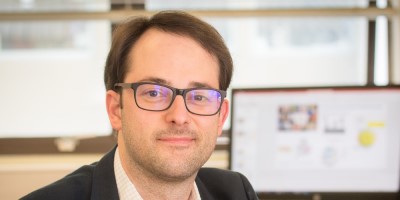News Library
Dr Mark Greenhalgh secures slice of £4m grant
Dr Mark Greenhalgh, has secured a substantial grant from the EPSRC to establish an international collaboration for his pioneering research in catalysis and molecular interactions.
Computational Surface Science Group celebrates Successes

The Computational Surface Science Group is celebrating a number of notable successesLink opens in a new window, from an exciting EPSRC-funded computing consortium, co-led by Reinhard Maurer, to great fellowship news.
Funding granted for cleaner, greener chemicals

Researchers at the Universities of Warwick and Nottingham have received EPSRC funding to launch a ground-breaking research programme for global specialist chemical manufacturer, Lubrizol.
Professor Gibson awarded €2M ERC grant
Professor Matthew Gibson has been awarded a prestigious €2M ERC consolidator grant for his work on new materials to help transport protein and cell-based therapies. The project ICE_PACK will support a cross disciplinary team of researchers based in both the Chemistry Department and also in Warwick Medical School.
Corinna Preuss awarded Newton International Fellowship
Dr Corinna Preuss has been awarded a Newton International Fellowship to conduct research at the University of Warwick’s Department of Chemistry.
Jointly run by The British Academy, The Academy of Medical Sciences and the Royal Society, the Fellowship is for non-UK scientists who are at an early stage of their research career and provides the opportunity for the best early stage post-doctoral researchers from all over the world to work at UK research institutions for a period of two years.
Speaking after being awarded the Fellowship Dr Preuss said:
“I’m very honoured and delighted to be awarded the Newton International Fellowship. Not only will it support my personal development but is also emphasises the novelty and importance of our proposed research project.”
Dr Preuss will work as part of a team led by Professor Stefan Bon to mimic the motional behaviour of zooplankton by fabricating artificial jelly-objects that have the capability to transform shape, swim, and – as an additional feature – release payloads. Dr Preuss says these hydrogel objects will have these three pre-programmed functions “which can be triggered on demand in a controlled fashion”. For this purpose, recent scientific advances in polymer and colloid chemistry will be merged with soft matter physics and robotics in order to create a promising and interdisciplinary research program
Further to the research with Professor Bon, Dr Preuss is keen to use the Fellowship to teach undergraduate chemists and to create a network with other fellow scientists, saying that: “In my opinion, exchanging knowledge and listening to different opinions is essential for the formation of a highly efficient scientific society”.
Discussing why she chose the University of Warwick Dr Preuss said:
“I met Professor Stefan Bon during a conference in Mexico. I was impressed by his research and the passion he presented it with. Later on, whilst I was presenting my research at the poster session, we got the chance to chat more and discovered that our interests in each other’s research would create a promising base for a further collaboration. In working with Stefan and coming to the University of Warwick, I’m taking the chance of changing my field of research to colloidal chemistry and engineering, which provides a new, challenging and fascinating area for me”.
2 September 2015
- Contacts:
Tom Frew - International Press Officer
Email: a.t.frew@warwick.ac.uk
Tel: +44 (0)247 657 5910
Mob: +44 (0)7785 433 155
- For more information please visit:
or follow on Twitter: twitter.com/bonlab
€1.7m ERC grant for Seb Perrier
Sebastien Perrier has been awarded a €1.7 million Consolidator Grant by the European Research Council for his work on tubular supramolecular polymers. These structures, pioneered by the Perrier group, are based on the assembly of cyclic peptide/polymer conjugates into nanotubes, held together by supramolecular interactions. They have a range of unique physical and chemical properties, and the ERC grant will allow the group to develop these systems further as drug delivery vectors. Recent work has shown that they can act efficiently to deliver anticancer drugs to cancer cells and enhance the drug activity, and the 5 years’ ERC funding will support further studies in this area.
€5 Million in ERC grants Awarded
3 Academics in the Department have been awarded prestigious ERC starting grants with a total value of almost €5 million. Set up in 2007 by the EU, the European Research Council (ERC) is the first pan-European funding organisation for frontier research. It aims to stimulate scientific excellence in Europe by encouraging competition for funding between the very best, creative researchers of any nationality and age.
Dr Adrian Chaplin will develop new synthetic methodology for studying the interaction of alkanes with transition metals.
will develop new synthetic methodology for studying the interaction of alkanes with transition metals.
Dr Matthew Gibson will study mimics of antifreeze (glyco)proteins with the aim of improving cell cryopreservation.
will study mimics of antifreeze (glyco)proteins with the aim of improving cell cryopreservation.
Dr Józef Lewandowski  will develop and apply approaches to investigate structural dynamics of large protein complexes by solid- and solution-state NMR.
will develop and apply approaches to investigate structural dynamics of large protein complexes by solid- and solution-state NMR.
These awards bring the total number of ERC-funded researches in the Department to 8, a clear testament to the internationally-leading nature of the research environment at Warwick.
Two new Centres for Doctoral Training
Warwick Chemistry has played a lead role in securing funding from the Engineering and Physical Sciences Research Council for 2 new Centres for Doctoral training, in Molecular Analytical Science and Diamond Science and Technology, as part of the recently announced UK's largest investment in postgraduate training in engineering and physical sciences. The Universities and Science Minister, David Willetts, announced the funding of over seventy new Centres for Doctoral Training (CDTs), spread across 24 UK universities on 22nd November.
For further information please visit:
http://onlinepressoffice.tnrcommunications.co.uk/universities-funding/video

Dr Rebecca Notman Awarded Royal Society University Research Fellowship
Dr Rebecca Notman has been awarded a prestigious 5-year Royal Society University Research Fellowship starting October 2012 to pursue a research project on “Modelling the Lipid Layers of the Human Skin Barrier”.
Nanodiamonds bring back sparkle to cleaning
Nanodiamonds have been found to help loosen crystallized fat from surfaces in a project led by Dr Andrew Marsh at University of Warwick. The tiny carbon particles transform the ability of surfactants to shift dirt in cold water, findings that could bring eco friendly low temperature laundry cycles.
The research is published in ACS Applied Materials and Interfaces and highlighted in the Daily Mail and Daily Telegraph, 26 June.
Nanodiamond Promotes Surfactant-Mediated Triglyceride Removal from a Hydrophobic Surface at or below Room Temperature Xianjin Cui, Xianping Liu, Andrew S. Tatton, Steven P. Brown, Haitao Ye, and Andrew Marsh ACS Applied Materials and Interfaces 2012, http://dx.doi.org/10.1021/am300560z
University of Warwick & partners awarded £1.4 million in national solar energy programme
The University of Warwick is a key part of a consortium that has just been awarded £1.4 Million by a new national programme designed to develop the next generation of solar energy harvesting technology.
The UK’s Technology Strategy Board and the Engineering and Physical Sciences Research Council has awarded the £1.4 million to a consortium that includes The University of Warwick; the companies Kurt Lesker, Asylum Research, New World Solar, and Molecular Solar, and Imperial College London. Together they will work on the development of Prototype High Efficiency Multi-Junction Organic Solar Cells.
Professor Tim Jones from the University of Warwick said:
“We are working with solar cells made from organic semiconductor materials which offer the prospect of very low cost manufacture of lightweight, flexible cells. They are made from sustainable materials and can be deployed as flexible sheets that could be used for a variety of applications including: a solar powered mobile phone charger that’s rolls up into a shape as small as the size of a pen, micro-lights that can be added to clothing, and a detachable sun-shade for automobile windscreens that powers a small integral fan to circulate air and cool the interior of the car when parked in direct sunlight.”
Peter Ballantyne from Molecular Solar, a spin-out company from the University of Warwick, which will be developing this new technology said:
“The low cost and flexibility of this new technology will lead to new applications that will further accelerate the growth of the solar power market, which has seen 40%/year growth over the last 10 years. Just one significant opportunity in consumer applications is the area of mobile phone chargers where over 1.3 billion units a year are produced.”
In total fifteen British businesses and seven universities will share £5 million of government funding from the UK’s Technology Strategy Board and the Engineering and Physical Sciences Research Council to enable them to research the use of novel nanoscale technologies to develop the next generation of solar energy harvesting.
Iain Gray, Chief Executive of the Technology Strategy Board said:
“These projects will help to position British businesses to exploit the growing global demand for solar energy harvesting technologies – and in the process help grow the British economy – while at the same time provide sustainable energy solutions for the UK. The projects are great examples of how to transfer commercially-focused research into the business community.”
David Delpy, Chief Executive of the Engineering and Physical Sciences Research Council said:
“This is the first example of Nanoscience research funding from the Research Councils being directly pulled through to application funding with the Technology Strategy Board via a stage-gated funding route. This approach actively supports economic growth whilst helping to solve one of society's greatest challenges.”
For further information please contact:
Professor Tm Jones University of Warwick Tel: +44 (0)2476 528265
Email: 

 t.s.jones@warwick.ac.uk
t.s.jones@warwick.ac.uk
Peter Dunn, Head of Communications
Communications Office, University House,
University of Warwick, Coventry, CV4 8UW, United Kingdom
email: p.j.dunn@warwick.ac.uk

Tel: +44 (0)24 76 523708 Mobile/Cell: +44 (0)7767 655860
PR34 25th March 2011
